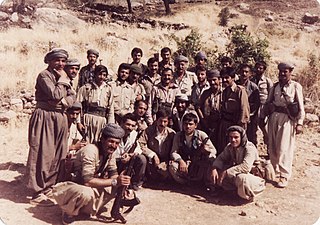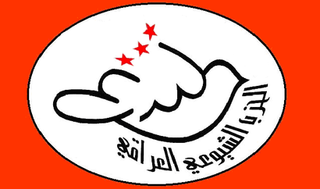
The Patriotic Union of Kurdistan is a Kurdish political party in Iraqi Kurdistan. The PUK describes its goals as self-determination, human rights, and democracy and peace for the Kurdish people of Kurdistan and Iraq. The current Secretary General is Kosrat Rasul Ali. Fuad Masum, co-founder of the PUK, was the President of Iraq from 2014 to 2018. It was founded on 22 May 1975 in Iraqi Kurdistan by Adel Murad, Nawshirwan Mustafa, Ali Askari, Fuad Masum, Jalal Talabani and Abdul Razaq Feyli.

The Kurdistan Communist Party/Iraq is a Kurdish political party, formed in 1993 when the Iraqi Communist Party branch in the Kurdish areas was formed into a separate party. The party is led by Kamal Shakir.

The Kurdish Democratic Party in Lebanon or Parti Democratique Kurde – Liban (PDK-L) in French, is the Lebanese branch of a namesake Iraqi-based Kurdish nationalist party, established by Jamil Mihhu in 1960, and based in Lebanon. However, it was not licensed until 24 September 1970.
The Razkari Party or Riz Kari is a Kurdish political group based in Lebanon that was established in 1975 by Faissal Fakhro.
Al-Wathbah uprising or simply Al-Wathbah, which means The Leap in Arabic, was the term that came to be used for the urban unrest in Baghdad in January 1948. The protests were sparked by the monarchy’s plans to renew the 1930 Anglo-Iraqi Treaty that effectively made Iraq a British protectorate. Nuri al-Said, the Prime Minister of Iraq, was planning on renewing, albeit in a revised form, this 1930 treaty that tied Iraq to British interests, allowed for the unrestricted movement of British troops on Iraqi soil, and provided significant protection to the British-installed Iraqi monarchy.
The National Democratic Party was an Iraqi political party.

Al-Ansar was a guerrilla force attached to the Iraqi Communist Party, active between 1979 and 1988.
Fahd's Revolutionary Organization was a communist organization in Iraq. The organization was founded in the middle of 1985, after a split from the Iraqi Communist Party. The founders of the organization consisted of younger cadres of the Communist Party, who opposed the party leadership. The organization sought to build a new Marxist-Leninist party, recalling the legacy of the Communist Party stalwarth leader Yusuf Salman Yusuf ('Fahd'). The organization published al-Munadhil ash-Shiui. The founder and leader of the organization, the labour leader Hikmat Kutani, was forced into exile in Canada. He became a member of Worker-communist Party of Iraq. Kutani died in 1999 in exile.
Ila al-Amam was a communist group in Iraq, known by the publication it issued under that name. The group publishing Ila al-Amam had been expelled from the Iraqi Communist Party in August 1942, after which they founded Ila al-Amam. The main leaders of the group were Thunun Ayub ('Qadir') and Yaqub Cohen ('Fadil'). Inside the Communist Party, Ayub had been a Central Committee member but had developed personal differences with the Communist Party general secretary Fahd.
Jamal al-Haidari was an Iraqi communist politician. He joined the Iraqi Communist Party in 1946, and became the leader of a rebel communist faction during the 1950s. After rejoining the Communist Party in 1956 he became a prominent leader but was entangled in the internal disputes of the party. In 1963 he was executed by the new Baathist regime.
The ar-Rashid revolt refers to a 1963 failed uprising against the Baathist government in Iraq. The revolt was plotted by followers of the Iraqi Communist Party in junction with military officers. The revolt failed to spread outside Baghdad and was crushed by the Baathist forces.

Hezb-e Wahdat-e Islami Afghanistan, shortened to Hezb-e Wahdat, was founded in 1989. Like most contemporary major political parties in Afghanistan, Hezb-e Wahdat is rooted in the turbulent period of the anti-Soviet resistance movements in Afghanistan in the 1980s. It was formed to bring together nine separate and mostly inimical military and ideological groups into a single entity. During the period of the Afghan civil war in the early 1990s, it emerged as one of the major actors in Kabul and some other parts of the country. Political Islamism was the ideology of most of its key leaders but the party gradually tilted towards its Hazara ethnic support base and became the key vehicle of the community's political demands and aspirations. Its ideological background and ethnic support base has continuously shaped its character and political agenda. Through the anti-Soviet jihad and the civil war, Hezb-e Wahdat accumulated significant political capital among Afghanistan's Hazaras.

The Kurdistan Democratic Party, usually abbreviated as KDP or PDK, is one of the main Kurdish parties in Iraqi Kurdistan. It was founded in 1946 in Mahabad in Iranian Kurdistan. The party claims it exists to combine "democratic values and social justice to form a system whereby everyone in Kurdistan can live on an equal basis with great emphasis given to rights of individuals and freedom of expression."
Nawshirwan Mustafa was an Iraqi Kurdish politician who served as the General Coordinator of the Movement for Change and the leader of the opposition in the Kurdistan Region from 1 April 2009 to his death on 19 May 2017.

The Iraqi Republic was a state forged in 1958 under the rule of President Muhammad Najib ar-Ruba'i and Prime Minister Abd al-Karim Qasim. ar-Ruba'i and Qasim first came to power through the 14 July Revolution in which the Kingdom of Iraq's Hashemite monarchy was overthrown. As a result, the Kingdom and the Arab Federation were dissolved and the Iraqi republic established. The era ended with the Ba'athist rise to power in 1968.

The National Progressive Front was an Iraqi Popular Front announced on 16 July 1973 and constituted in 1974, ostensibly formed within the framework of a "joint action programme" to establish a coalition between the Arab Socialist Ba'ath Party, the Iraqi Communist Party, the Kurdistan Revolutionary Party, a pro-government section of the Kurdish Democratic Party, and miscellaneous independents. The Iraqi Communist Party were removed from the NPF in 1979 while the Kurdish Democratic Party suffered restrictions when Saddam Hussein came to power after 1979. The creation of the Front ensured the leading role of the Ba'athists in state and society whilst allowing limited autonomy for other participating parties loyal to the government. Iraqi leader Saddam Hussein spoke of it once as "one of the essential forms to voice our will and to deepen democracy and political participation of the people and the national forces in building the new experiment in all fields." In effect the Front was controlled and maintained solely by the Ba'ath, with all other legal political forces acting in subservience to it.
The Kurdish Democratic Political Union, or KDPU was a Syrian Kurdish alliance linked to Iraqi Kurdish president Massoud Barzani's Kurdistan Democratic Party (KDP).









